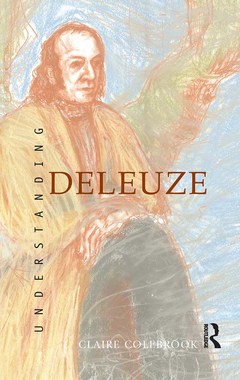Understanding Deleuze
Auteur : Colebrook Claire

A genuine attempt to think differently, Gilles Deleuze's work challenges, provokes and frustrates. Surprisingly practical as well as innovative, it is now being seen as a 'must read' for students and scholars across the humanities and social sciences. Claire Colebrook's Understanding Deleuze offers a comprehensive and very accessible introduction to his work. hink differently. It is built on the notion of an immanent ethics: how can we have a political and ethical theory without some external foundation such as the subject or morality? He argues that the only way we can do this is with a theory of the virtual, and he sees all life (not just cyberculture) as virtual. Deleuze goes further than Foucault or Derrida in questioning the boundaries of the subject and knowledge. For Deleuze perception extends beyond the human, to animals, machines and microorganisms.
Deleuze's writing is challenging and hard to read, and so far there is no introduction to his work. Claire Colebrook's primer offers an accessible introduction to the whole Deleuzian oeuvre, including the work he did with Guattari.
Foreword
Acknowledgements
The impact of Deleuze
A guide to key Deleuzean terms
Introduction
1. Beyond representation and structure
2. The politics of life and positive difference
3. Style and immanence
4. 'Doing philosophy': Interdisciplinarity
5. History of desire
6. Perception, time, cinema
Conclusion: Virtual freedom
Bibliography
Index
Claire Colebrook is Reader in the Department of English Literature at the University of Edinburgh. She is author of New Literary Histories, Ethics and Representation, and Gilles Deleuze, and coeditor with Ian Buchanan of Deleuze and Feminism.
Date de parution : 03-2021
13.8x21.6 cm
Thème d’Understanding Deleuze :
Mots-clés :
Vice Versa; Intensive Difference; philosopher Gilles Deleuze's; Ultimate Presence; territorialisation; Virtual Difference; Deleuze's essay Mediators; Disengaged; Social Machine; Deleuze’s Work; Modern Cinema; Extensive Multiplicity; Stimulus Response Circuit; Intensive Multiplicity; Sensuous Signs; Pop Star; Passive Synthesis; Main Character; Repetition Deleuze; Capitalist Social Machines; Deleuze’s Thought; Virtual Totality; Sick Rose; Indifferent Difference; Moral Image; Hiroshima Mon Amour; Imperceptible Differences; Deleuze’s Politics



